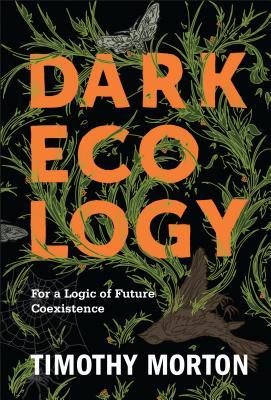
DARK ECOLOGY: For a Logic of Future Coexistence
TIMOTHY MORTON
Columbia University Press
$30.00 hardcover, available now
Rating: 3.5* of five
The Publisher Says: Timothy Morton argues that ecological awareness in the present Anthropocene era takes the form of a strange loop or M?bius strip, twisted to have only one side. Deckard travels this oedipal path in Blade Runner (1982) when he learns that he might be the enemy he has been ordered to pursue. Ecological awareness takes this shape because ecological phenomena have a loop form that is also fundamental to the structure of how things are.
The logistics of agricultural society resulted in global warming and hardwired dangerous ideas about life-forms into the human mind. Dark ecology puts us in an uncanny position of radical self-knowledge, illuminating our place in the biosphere and our belonging to a species in a sense that is far less obvious than we like to think. Morton explores the logical foundations of the ecological crisis, which is suffused with the melancholy and negativity of coexistence yet evolving, as we explore its loop form, into something playful, anarchic, and comedic. His work is a skilled fusion of humanities and scientific scholarship, incorporating the theories and findings of philosophy, anthropology, literature, ecology, biology, and physics. Morton hopes to reestablish our ties to nonhuman beings and to help us rediscover the playfulness and joy that can brighten the dark, strange loop we traverse.
THE PUBLISHER PROVIDED A REVIEW COPY OF THE BOOK. THANK YOU.
My Review: I can honestly say that Author Morton was writing directly to my most dearly held concerns. The Anthropocene, the current post-Holocene epoch of geological time, is a given in the author's thinking; if you're not in sync with 21st-century thinking and deny that climate change is not only happening but is largely if not entirely of human genesis, this book will not do one single thing for you. That is, it will make you screechingly furious, but it won't change your mind.
For the rest of us, the book's foundations in logic has lacunae. I'd expected to see the role of Big Science play a major part here; also Toxic Technology; instead Author Morton focuses on the philosophical and cultural roots of the Anthropocene. It's less about What Happened than it is about Why Things Are. We go down a bunch of rabbit holes to explore the nature of the Anthropocene's genesis, we spend a lot of time (in the footnotes) digging for truffles in the dirt of our Collective Unconscious, and in the end come to the surface of our minds with some useful new concepts. "Agrilogistics" and "ecognosis" are worthy neologisms for deep and tangled concepts. A simple explanation of them is that the reductive power of modern STEM-based environmental discussion ignores a huge reservoir of knowledge that comes from our shared, lived experience; this isn't in any way a comprehensive explanation so my suggestion is to read the 192 pages of the book slowly and carefully.
It repaid me enormously to do so and it could do that for you as well.
No comments:
Post a Comment
Note: Only a member of this blog may post a comment.